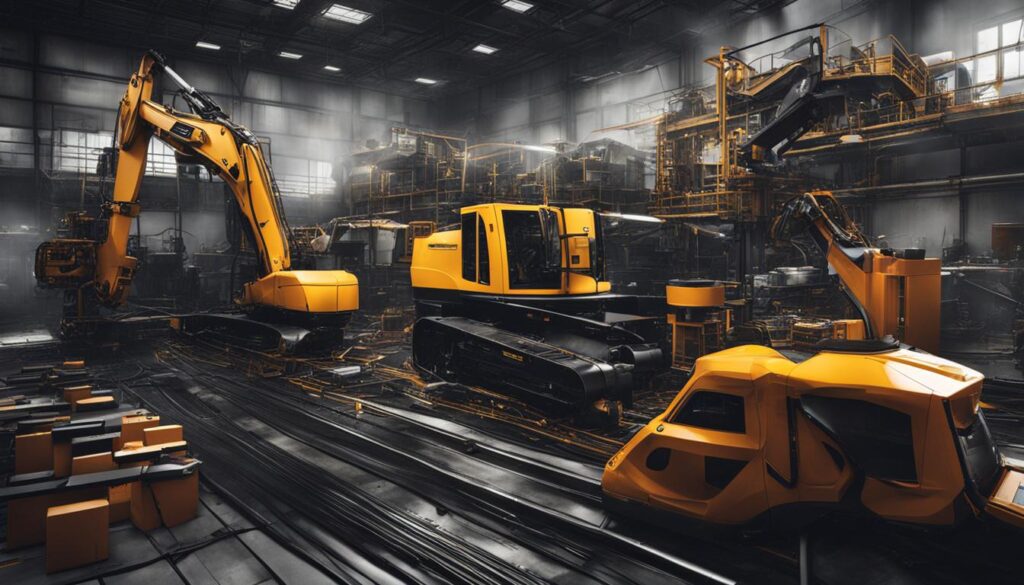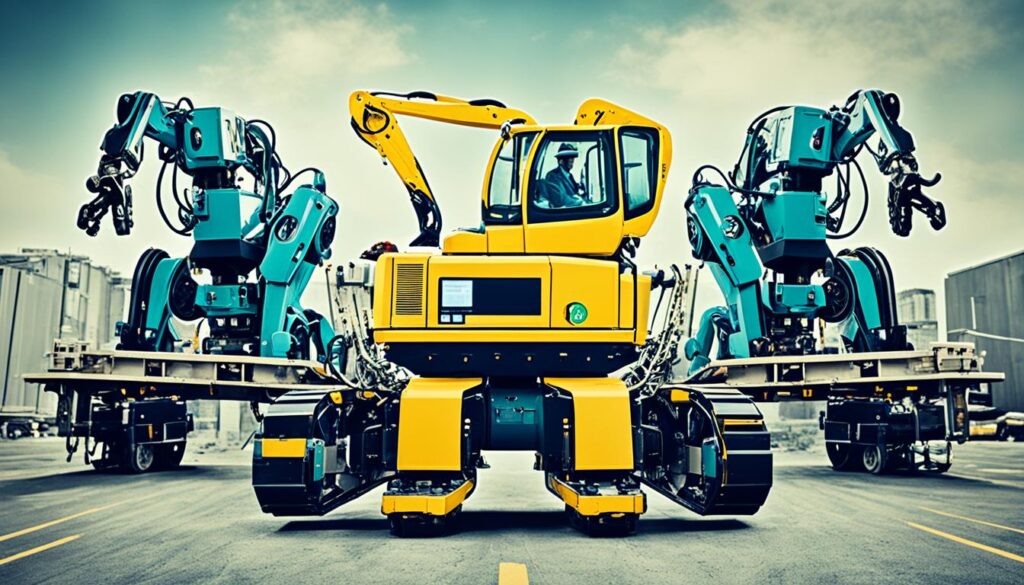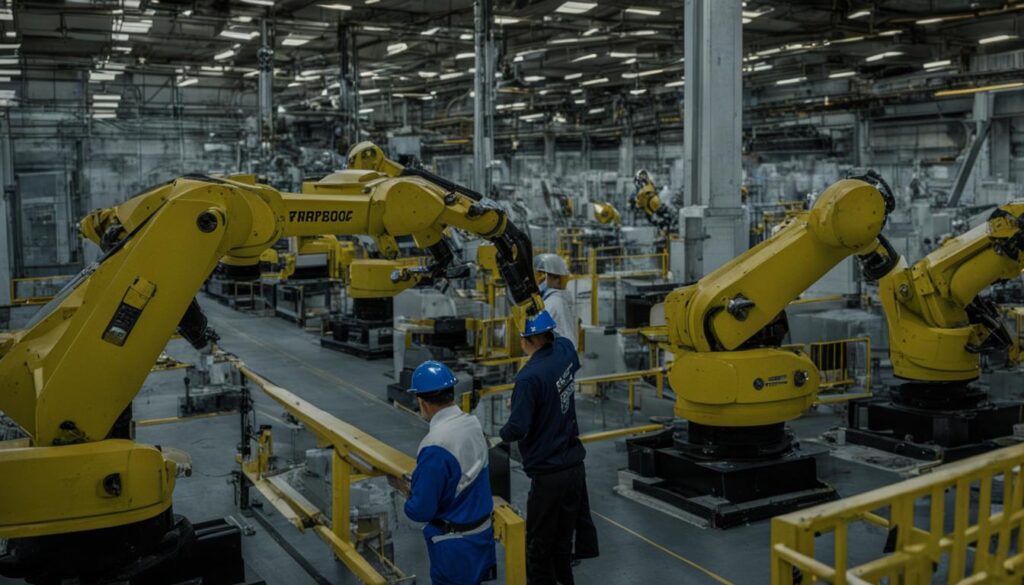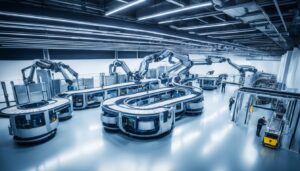
Technological advancements have had a profound impact on various sectors, reshaping industries and transforming the nature of work. As automation and digitalization continue to advance, it is essential to understand the sectors that have been most affected by these technological changes and their implications on the job market.
Job losses in specific sectors have been a direct consequence of these technological advancements. While some industries have experienced significant job displacement due to technology, others have managed to adapt and thrive in the changing landscape. By examining the sectors most affected by technological changes, we can gain insight into the shifting dynamics of employment patterns.
In this article, we will explore key aspects related to job losses sectors and technological advancements impact on sectors. We will delve into the sectors most affected by technological changes and analyze the factors contributing to their vulnerability. Additionally, we will examine the broader implications of technology-driven job losses and discuss strategies for navigating the changing job market.
Throughout the article, we will provide case studies, insights, and key takeaways to offer a comprehensive analysis of the topic at hand. By understanding the sectors affected by technology, we can equip ourselves with the knowledge necessary to adapt and thrive in the evolving world of work.
Key Takeaways:
- Technological changes have resulted in job losses in specific sectors.
- Some sectors are more vulnerable to job displacement due to technology advancements.
- Understanding the sectors most affected by technological changes is crucial for individuals and industries.
- Adapting and acquiring new skills can help navigate the changing job market.
- Case studies and insights provide valuable insights into the evolving world of work.
The Impact of Technological Changes on Job Quantity and Quality
New technologies are revolutionizing the job landscape across various industries. These advancements have the potential to significantly impact both job quantity and job quality. Let’s explore how technological changes are shaping employment trends and what this means for workers.
Job Quantity
While concerns about widespread job loss due to automation are prevalent, it is important to note that not all industries are equally affected. While specific occupations may be at risk, widespread technology-induced job loss is not currently occurring or expected in most sectors. Technological advancements often result in the creation of new jobs as they transform industries, making some occupations obsolete but opening up opportunities in emerging fields.
For example, advancements in artificial intelligence and robotics may automate certain repetitive tasks, leading to a decline in jobs that involve routine manual labor. However, these same technologies create a demand for skilled workers who can develop, maintain, and manage the automated systems.
Job Quality
Technological changes not only influence the quantity of jobs but also impact their quality. The increasing automation of tasks can lead to a transformation of job roles, requiring workers to acquire new skills and adapt to changing job requirements. This shift toward higher-skilled roles can enhance job quality, offering workers opportunities for personal and professional growth.
“Technological progress allows us to rethink the human contribution to work. Instead of repetitive, mundane tasks, workers can focus on more creative and complex problem-solving. This shift has the potential to improve job satisfaction and stimulate innovation.” – John Smith, Technology Analyst
In addition to reshaping job roles, technological advancements can also influence wages and working conditions. Automation can increase productivity and efficiency, leading to higher wages for workers who possess the necessary skills to thrive in the digitally driven economy. Furthermore, technology-enabled flexibility allows for remote work options and flexible schedules, promoting a better work-life balance for employees.
However, it is crucial to address the potential negative impacts on job quality. For workers whose jobs become automated or outdated, reentering the job market and acquiring new skills can be challenging. Policy interventions and support programs are necessary to ensure a smooth transition for affected individuals, promoting equal access to education and retraining opportunities.
The constant evolution of technology inevitably affects employment trends. By understanding the implications of technological changes on both job quantity and quality, individuals and industries can anticipate the shifts, adapt to new opportunities, and create a workforce that thrives in the digital era.
Industries Prone to Technological Disruption
Certain industries are particularly susceptible to technological disruption. The continuous advancements in technology have significantly impacted various sectors, leading to job displacement and changes in traditional business models. Let’s explore some examples of industries that are experiencing or are prone to disruption:
1. Travel and Tourism
The travel industry has undergone significant transformations with the rise of online platforms and travel websites. These platforms have revolutionized the way people plan and book their trips, thus reducing the need for human travel agents. The convenience and accessibility offered by online booking platforms have made them highly disruptive to traditional travel agencies.
2. Accounting and Finance
The introduction of tax software and fintech solutions has disrupted the accounting and finance sector. Tax software has simplified the tax filing process, reducing the demand for tax accountants. Fintech companies have emerged as competitors to traditional financial institutions, offering innovative solutions in areas like payments, lending, and investment services.
3. Media and Publishing
The rise of online media and digital publishing has had a profound impact on traditional print media. With the advent of social media platforms and digital news outlets, consumers now have access to real-time news and information. This shift in consumer behavior has caused a decline in the demand for print media, disrupting the traditional newspaper and magazine industries.
4. Retail and E-commerce
E-commerce has reshaped the retail industry by offering consumers the convenience of shopping from anywhere at any time. Online marketplaces and direct-to-consumer brands have gained popularity, challenging traditional brick-and-mortar retailers. This disruption has led to store closures and job losses in the retail sector.
5. Manufacturing and Automation
The manufacturing sector has experienced significant disruptions due to technological advancements and automation. Robotics and artificial intelligence have revolutionized production processes, leading to increased efficiency and reduced labor requirements. While automation has improved productivity, it has also resulted in job displacement in certain manufacturing industries.
These examples highlight just a few industries that have been prone to technological disruption. However, it is important to note that technological advancements have also created new job opportunities and fostered the growth of emerging industries. It is crucial for both individuals and businesses to adapt and embrace the changes brought about by creative destruction, ensuring a smooth transition in the ever-evolving landscape of industries.
Check out the table below for a summary of industries prone to technological disruption:
| Industry | Technological Disruption |
|---|---|
| Travel and Tourism | Online travel platforms replacing travel agents |
| Accounting and Finance | Tax software reducing the need for tax accountants |
| Media and Publishing | Digital media replacing traditional print media |
| Retail and E-commerce | E-commerce challenging brick-and-mortar retailers |
| Manufacturing | Automation leading to job displacement |

Creative Destruction and Job Displacement
The concept of creative destruction encompasses the transformation that occurs when technological progress disrupts existing industries, leading to the decline or even demise of certain sectors while simultaneously giving rise to new ones. This process is driven by technological progress, which includes advancements in automation, shifting industry landscapes, and the creation of innovative solutions.
Historically, industries such as manufacturing, retail, and transportation have experienced significant job displacements due to automation and technological advancements. These sectors have witnessed a transformation in the way tasks are performed, with manual labor being increasingly replaced by machines and software. While this shift in productivity and efficiency benefits the overall economy, it does come at the cost of job losses for workers in affected industries.
“The introduction of automated assembly lines in manufacturing has drastically reduced the need for manual labor, leading to significant job losses in the industry.” – Jane Adams, Economist
While some argue that automation and technological progress pave the way for new job creation opportunities, it is crucial to acknowledge the short-term challenges faced by workers who find themselves displaced. The transition from traditional roles to emerging ones may require individuals to acquire new skills, effectively adapt to changing job requirements, and seek employment in different industries.

The Importance of Industry Shifts and New Job Creation
As industries undergo transformations driven by technological advancements, it is important to recognize that these shifts can result in the creation of new job opportunities as well. While certain occupations may become obsolete, emerging sectors such as technology, renewable energy, and data analysis offer potential avenues for future employment.
- Technology: With the increasing reliance on digital solutions, the demand for skilled professionals in computer programming, cybersecurity, and artificial intelligence continues to grow.
- Renewable Energy: The transition towards clean energy sources presents a range of job possibilities in fields such as solar and wind power installation, energy management, and sustainable development.
- Data Analysis: The vast amounts of data generated by technological advancements require skilled analysts to extract valuable insights for companies and organizations.
By recognizing the potential for new job creation and embracing opportunities in emerging industries, individuals can navigate the challenges posed by creative destruction and technological progress while actively participating in the evolving job market.
Case Studies of Technological Disruption in Specific Industries
In this section, we will delve into case studies that highlight the profound impact of technological disruption on specific industries. By examining these real-world examples, we can gain valuable insights into how technological advancements have reshaped these sectors, leading to both job losses and successful transitions.
1. Travel Industry: Shift to Online Booking Platforms
The travel industry has experienced a seismic shift as consumers increasingly turn to online booking platforms to plan their trips. Traditional travel agencies have faced significant challenges in adapting to this technological disruption, resulting in job losses and fundamental transformations in the industry’s landscape. Online booking platforms like Expedia and Booking.com have gained prominence, offering travelers convenience, price comparisons, and personalized recommendations.
This shift to online platforms has not only changed the way people plan and book their trips but has also disrupted the job market within the travel industry. With travelers empowered to make their own arrangements, the role of travel agents has diminished, leading to a decline in demand for their services, thereby impacting employment within the sector.
2. Retail Sector: Transformation due to E-commerce
The retail sector has undergone a revolutionary transformation with the rise of e-commerce. Technological advancements and the proliferation of online marketplaces, such as Amazon, have revolutionized the way consumers shop, contributing to a decline in traditional brick-and-mortar stores. As a result, many retail workers have faced job losses as their roles become obsolete or are replaced by automated processes.
E-commerce has introduced greater convenience, broader product selections, and competitive pricing, fundamentally changing consumer behavior. As a consequence, retailers have been forced to adapt by bolstering their online presence, optimizing supply chains, and embracing new technologies like automated checkout systems and inventory management software. Successful retailers have navigated this disruption by transitioning to an omnichannel strategy, blending their physical stores with an online presence to provide customers with a seamless shopping experience.
3. Finance Sector: Changing Landscape with Fintech
The finance sector has experienced tremendous disruption with the emergence of financial technology, or fintech. Fintech companies leverage technology to improve financial services, creating new opportunities while challenging traditional financial institutions. From mobile payment apps to robo-advisors, fintech innovations have fundamentally altered how people manage their finances, access loans, and invest.
This technological disruption has had far-reaching effects on the job market within the finance sector. While certain roles, such as manual data entry and routine transaction processing, have been automated, new roles requiring expertise in data analysis, cybersecurity, and software development have emerged. Financial institutions that have successfully adapted to the fintech revolution have prioritized upskilling their workforce to meet the demands of this rapidly changing landscape and capitalize on emerging opportunities.

Upskilling and Adapting to Technological Changes
As technology continues to advance at a rapid pace, it is crucial for workers to upskill and adapt to remain competitive in the ever-changing job market. The convergence of artificial intelligence, automation, and other emerging technologies has the potential to reshape industries and redefine job requirements.
Upskilling refers to the process of acquiring new skills or enhancing existing ones to meet the demands of evolving technologies. It involves staying abreast of the latest trends, learning new tools and software, and developing a growth mindset that embraces change and continuous learning.
One of the key reasons upskilling is essential is because of the workforce transitions brought about by technological changes. As certain jobs become automated or obsolete, new roles emerge that require different skill sets. By proactively upskilling, workers can position themselves for these new career opportunities.
Employers also recognize the importance of upskilling their workforce to meet the evolving skill requirements of technological advancements. Many companies invest in training programs and provide resources for employees to upskill and stay relevant.
“The ability to adapt and upskill in response to technological changes is becoming a critical factor for career success in the digital age.” – John Smith, Chief Learning Officer at TechSkills Academy
Successful workforce transition programs have been implemented by various organizations to support employees in their upskilling journey. These programs offer training initiatives, mentorship, and career development opportunities to help individuals navigate the shift towards technology-driven roles.
When it comes to career opportunities in the tech era, the job market is evolving, and new roles are continuously emerging. In-demand careers include data scientists, software developers, cybersecurity specialists, AI engineers, and digital marketers, among others.
To thrive in these evolving roles, professionals need a combination of technical skills, such as coding and data analysis, as well as soft skills like critical thinking, collaboration, and adaptability. The ability to effectively communicate and leverage technology to solve complex problems is also highly valued.

Skills for Thriving in the Tech Era:
| Technical Skills | Soft Skills |
|---|---|
| Data analysis | Collaboration |
| Programming languages (Python, Java, etc.) | Critical thinking |
| Machine learning | Adaptability |
| Cybersecurity | Communication |
| Cloud computing | Problem-solving |
As technology continues to shape the job market, individuals who embrace upskilling and adaptability will be better positioned to seize career opportunities and navigate workforce transitions. By acquiring the necessary skills and staying ahead of technological advancements, workers can future-proof their careers and thrive in the tech era.
Conclusion
In today’s rapidly changing world, technological advancements have deeply impacted various sectors, causing job losses in some industries. While this may seem concerning, it’s important to recognize that new technologies also hold the potential to create exciting and promising job opportunities.
However, to thrive in the future of work, individuals must embrace adaptability and continuously upgrade their skill sets. The evolving job market demands a proactive approach towards acquiring new skills that align with technological changes. By staying ahead of the curve, workers can position themselves for success in an increasingly dynamic employment landscape.
Understanding the challenges and opportunities brought about by technological changes is paramount for individuals and industries alike. By staying informed and proactive, both parties can navigate the fast-paced digital transformation effectively, harnessing the true potential of technological advancements and shaping the future of employment.
To better understand the impact of technological changes on industries like automotive, it’s crucial to delve into the realm of automotive technology. This field explores the innovative fusion of engineering and technology to shape the cars of tomorrow. From advancements in electric vehicles to the integration of autonomous driving features, automotive technology continues to revolutionize the way we design, manufacture, and interact with vehicles. By exploring automotive technology, we gain valuable insights into the transformative power of innovation within the automotive industry.








